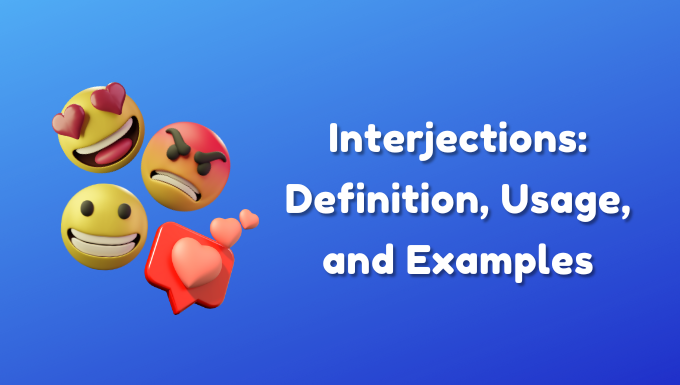
Table of Contents
In the colorful world of English, interjections are like splashes of paint that express emotions, reactions, and surprise. These small words can pack a big punch in your conversations and writing, making them more lively and expressive. But what exactly are they, and how do you use them effectively? Let’s dive into the world of these expressive words and find out!
What are Interjections?
Interjections are words or phrases used to express strong emotions or sudden bursts of feeling. They can stand alone or be used within sentences. Common examples include “Wow!”, “Oops!”, “Yikes!”, and “Hurray!” They are often followed by an exclamation mark when written, emphasizing their emotional intensity.
Types of Interjections and Their Uses:
- Joy and Excitement: Words like “Yay!”, “Hurray!”, and “Woohoo!” convey happiness and excitement. Example: “Yay! We won the game!”
- Surprise: “Wow!”, “Whoa!”, and “Oh!” are often used to express surprise. Example: “Wow! That was an amazing performance!”
- Disappointment and Sympathy: “Oh no!”, “Alas!”, and “Unfortunately,” are used to show empathy or disappointment. Example: “Oh no, I forgot my keys at home.”
- Agreement: “Yeah!”, “Yes!”, and “Indeed” are affirmative interjections. Example: “Yes! I completely agree with you.”
- Hesitation: “Umm”, “Er”, and “Uh” indicate hesitation or thinking time. Example: “Umm, I’m not sure about that.”
- Grief or Pain: “Ouch!”, “Alas!”, and “Oh dear” are used when expressing pain or sorrow. Example: “Ouch! I just stubbed my toe.”
Interjections in Everyday Language:
Interjections are not just for dramatic expressions; they’re also part of everyday language. They can soften a statement, add humor, or show politeness. For example, saying “Well, I think it’s time to go” uses “Well” as a softening interjection.
Using Interjections Effectively:
- Match the Tone: Ensure the interjection matches the tone and context of what you’re saying or writing.
- Don’t Overuse: Overusing interjections can make your speech or writing seem immature or unprofessional.
- Be Expressive: Interjections are a great way to convey emotions in storytelling or when sharing experiences.
Test Your Understanding of Interjections
Below are several sentences, each missing an interjection. Choose the most appropriate interjection from the list provided to complete each sentence. Remember, an interjection is a word or phrase that expresses emotion or a reaction.
List of Interjections: Wow, Oops, Yay, Alas, Hurray, Uh-oh, Aha, Eek, Phew, Well
Sentences:
- “_____, I finally figured out the solution to this puzzle!”
- “_____, I didn’t expect to see you here!”
- “_____! That was a close call!”
- “_____, I think I left my keys in the car.”
- “_____! We won the championship game!”
- “_____! That spider just scared me!”
- “_____, it looks like it’s going to rain on our picnic.”
- “_____, I forgot to bring my homework.”
- “_____! I can’t believe how beautiful this view is!”
- “_____, I guess we’ll have to try a different approach.”
Instructions: Fill in the blanks with the interjection that best fits the context of each sentence. This exercise will help you understand how different interjections are used to express various emotions and reactions in English. After completing the exercise, check your answers to see how well you understand the use of interjections.
Conclusion:
Interjections are a fun and integral part of the English language, adding color and emotion to our communication. Whether you’re writing or speaking, using these expressive words appropriately can greatly enhance the way you share your thoughts and feelings. So go ahead, express yourself with these fascinating bursts of language!
Interjections can turn a simple sentence into a vivid expression of emotion, making them an essential tool for anyone looking to spice up their English language skills.
FAQs
FAQ 1: What exactly is an interjection in English?
- Answer: An interjection is a word or phrase that expresses emotion or a sudden burst of feeling. It often stands alone or is inserted into a sentence and is typically followed by an exclamation mark. Examples include “Wow!”, “Oops!”, and “Hurray!”
FAQ 2: Can interjections be used in formal writing?
- Answer: While interjections are more common in casual speech and writing, they can be used in formal writing to convey strong emotions or reactions. However, they should be used sparingly to maintain the formality and seriousness of the text.
FAQ 3: Are there different types of interjections?
- Answer: Yes, there are various types of interjections, each expressing different emotions. Some express joy (e.g., “Yay!”), surprise (“Wow!”), agreement (“Yes!”), hesitation (“Umm”), or pain (“Ouch!”), among others. The type of interjection used depends on the emotion or reaction being expressed.